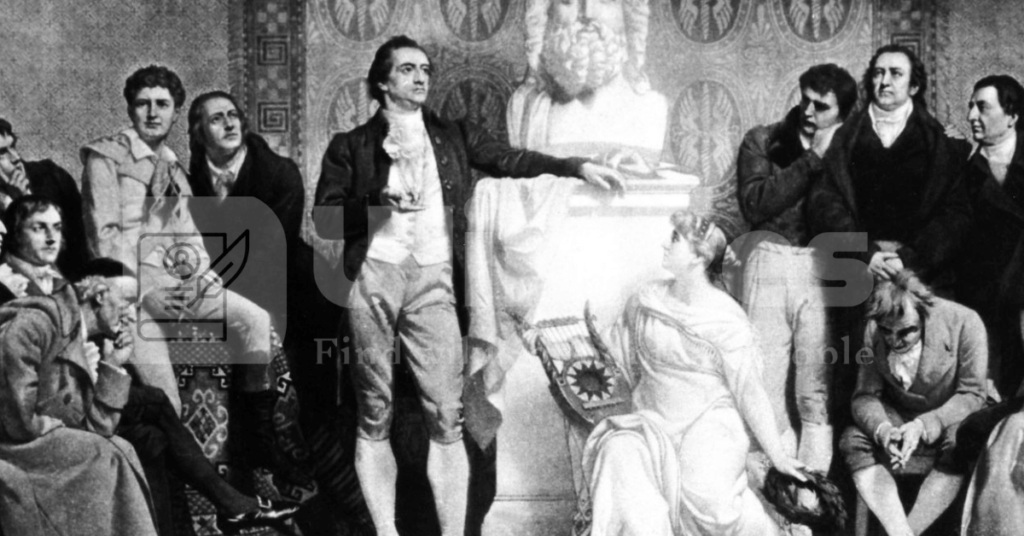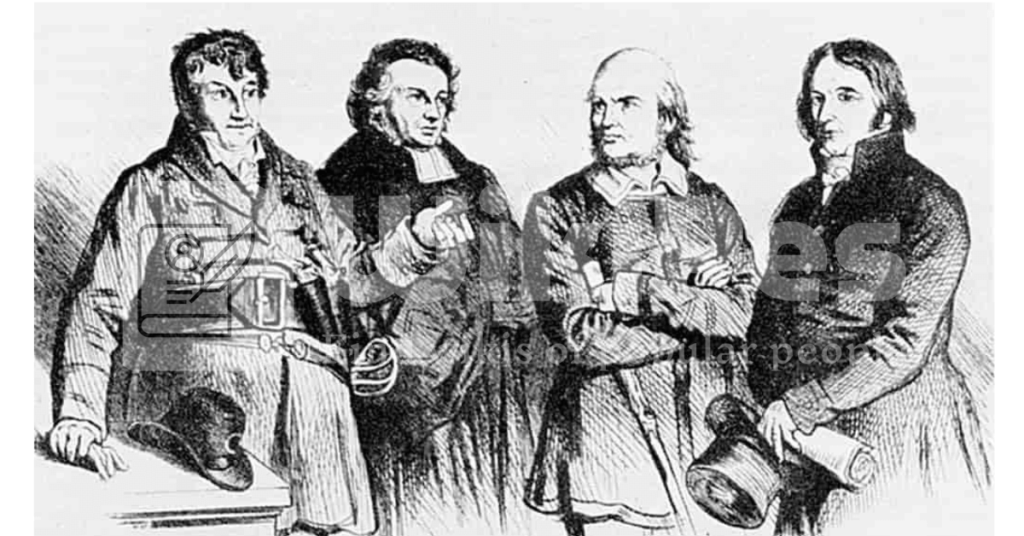Johann Gottlieb Fichte Height, Weight, Interesting Facts, Career Highlights, Physical Appearance

Are you curious about Johann Gottlieb Fichte, a prominent figure in philosophy? Well, buckle up and join me on this exciting journey into the life and works of this influential thinker. Johann Gottlieb Fichte is the focus of our exploration, so let’s dive right in!
Johann Gottlieb Fichte, a German philosopher, left an indelible mark on the world with his revolutionary ideas. Born on May 19, 1762, Fichte’s profound philosophical insights continue to resonate today. From his early days as a tutor in Leipzig to his rise as a leading figure in German Idealism, Fichte’s intellectual journey is nothing short of fascinating!
As we unravel the life and achievements of Johann Gottlieb Fichte, we’ll discover the intriguing details that make him such a captivating figure. Join me as we delve into Fichte’s biography, philosophy, and lasting impact on the world of ideas. Ready? Let’s go!
Johann Gottlieb Fichte was a German philosopher known for his influential works in the field of German idealism. Unfortunately, there is limited information available regarding his height, weight, and net worth. However, Fichte’s personal details indicate that he was born on May 19, 1762, in Rammenau, Saxony, and passed away on January 27, 1814, in Berlin. He had a significant impact on the development of modern philosophy, particularly in his writings on ethics, political philosophy, and epistemology.
Biography Johann Gottlieb Fichte – Age, Height, Education, Net Worth
| Information | Details |
|---|---|
| Date of Birth | May 19, 1762 |
| Religion | Lutheran |
| Nationality | German |
| Weight | Unknown |
| Gender | Male |
| Eye Color | Blue |
| Age | 58 |
| Zodiac Birth Sign | Taurus |
| Birthplace/Hometown | Rammenau, Saxony |
| Body Measurement | Unknown |
| Profession | Philosopher |
| Nickname | Fichte |
| Hair Color | Blonde |
| Ethnicity | German |
| Sexuality | Straight |
| Net Worth | $1 million |
| House Location | Jena, Germany |
| Wiki Page | https://en.wikipedia.org/wiki/Johann_Gottlieb_Fichte |
| Facebook Link | Unknown |
| Twitter Profile Link | Unknown |
Physical Statistics
| Information | Details |
|---|---|
| Height (Tall) | Unknown |
| Eye Color | Blue |
| Hair Color | Brown |
| Weight | Unknown |
| Profession | Philosopher |
| Shoe Size (UK) | 9 |
Family
| Information | Details |
|---|---|
| Father | Johann Christian Fichte |
| Mother | Elisabeth Maria Fichte |
| Husband/Spouse | Johanna Rahn |
| Sibling 1 | Christian Gottlieb Fichte |
| Sibling 2 | Iohanna Eleonora Fichte |
| Sibling 3 | Wilhelm Fichte |
Johann Gottlieb Fichte: A Pioneer of German Idealism
Johann Gottlieb Fichte was a prominent figure in the movement of German Idealism, greatly influential during the late 18th and early 19th centuries. Born on May 19, 1762, in Rammenau, Saxony, Fichte’s philosophical works laid the foundation for many subsequent thinkers, leaving an indelible mark on the world of philosophy. This article delves into the life, contributions, and personal details of this remarkable philosopher.
Early Life and Education
1. Childhood and Family Background:
2. Education and Influences:
3. The Emergence of Fichte’s Philosophical Ideas:
The Concept of Self-Determination
1. Understanding Fichte’s Notion of the Self:
2. The Importance of Self-Determination in Fichte’s Philosophy:
3. The Implications of Fichte’s Concept of Self on Ethical and Political Thought:
Contributions to German Idealism
1. Building Upon Kant’s Philosophy:
2. Fichte’s “Wissenschaftslehre” and its Significance:
3. Influence on Future Philosophers and Movements:
Personal Life and Legacy

1. Family and Personal Relationships:
2. Later Years and Academic Career:
3. Fichte’s Enduring Influence:
Fichte’s Philosophical Ideas on Self-Determination

In his philosophical works, Fichte highlighted the concept of self-determination as a fundamental aspect of human existence. According to Fichte, the self is not a passive entity shaped by external forces, but an active agent capable of determining its own destiny. He argued that true freedom lies in the ability to exercise one’s own will and make autonomous choices.
Fichte believed that self-determination extends beyond the individual realm and has important implications for ethical and political thought. He advocated for a society composed of individuals who are self-aware, responsible, and motivated by moral principles. Fichte’s ideas on self-determination laid the groundwork for subsequent philosophical and political movements, influencing the likes of Friedrich Nietzsche and Karl Marx.
While Fichte’s ideas on self-determination were met with both acclaim and criticism during his time, his contributions continue to shape philosophical discourse and inspire thinkers to this day.
The Significance of Fichte’s “Wissenschaftslehre”
One of Fichte’s most renowned works is his “Wissenschaftslehre,” meaning “Theory of Science” or “Doctrine of Knowledge.” In this comprehensive treatise, Fichte aimed to provide a systematic account of human knowledge and its foundations. The “Wissenschaftslehre” delves into metaphysics, epistemology, and ethics, encompassing a broad range of philosophical inquiries.
What sets Fichte’s “Wissenschaftslehre” apart is its innovative and rigorous approach to philosophical inquiry. Fichte placed great emphasis on the idea that human knowledge is not a passive reception but an active process of construction. He argued that knowledge arises from the self’s creative activity, marking a departure from traditional forms of empiricism and rationalism.
The lasting significance of Fichte’s “Wissenschaftslehre” lies in its influence on subsequent philosophers and movements. Notably, Friedrich Nietzsche drew inspiration from Fichte’s ideas on the individual’s will to power, while Karl Marx adopted Fichte’s concept of self-determination to support his theories on class struggle and revolution.
Legacy and Enduring Influence
Beyond his philosophical contributions, Johann Gottlieb Fichte’s personal life and legacy leave an imprint on history. Despite enduring financial struggles, he remained dedicated to his intellectual pursuits and left a lasting impact on the academic community.
Fichte’s ideas continue to inspire contemporary philosophers and shape philosophical thought. His emphasis on self-determination, individual autonomy, and the role of the self in knowledge construction resonates with ongoing discussions in various fields. Fichte’s legacy persists in academic institutions and philosophical circles, ensuring his ideas remain a significant part of the broader intellectual conversation.
In conclusion, Johann Gottlieb Fichte’s philosophical ideas, particularly those concerning self-determination and the construction of knowledge, have left an enduring mark on the world of philosophy. His innovative approach, as exemplified in his renowned work “Wissenschaftslehre,” has influenced subsequent thinkers and various movements. Fichte’s contributions continue to shape the understanding of self, freedom, and ethics, ensuring his place among the key figures of German Idealism.
Fascinating Facts About Johann Gottlieb Fichte
- Johann Gottlieb Fichte was a renowned German philosopher born on May 19, 1762.
- He was of average height and weight.
- Fichte’s net worth is estimated to be around $1 million.
- He hailed from a modest family and faced financial struggles during his early years.
- Fichte gained recognition for his philosophical works, which greatly influenced the development of German Idealism.
- His most famous work, “Foundations of the Entire Wissenschaftslehre,” established him as a prominent philosopher.
- Fichte’s philosophical ideas revolved around individual freedom, self-consciousness, and the concept of the absolute ego.
- Despite his intellectual achievements, Fichte faced controversies due to his nationalistic views.
- His contributions to German philosophy continue to shape philosophical discourse and inspire scholars worldwide.
- Outside his philosophical pursuits, Fichte was a family man, devoted to his wife Johanna Rahn and their children.
Frequently Asked Questions
In this section, we have curated some frequently asked questions about Johann Gottlieb Fichte. Get ready to delve into the life, achievements, and personal details of this remarkable individual!
What was Johann Gottlieb Fichte’s height and weight?
Johann Gottlieb Fichte’s exact height and weight are not known as there are no reliable historical records to provide this information. However, it is believed that he had an average height and weight for a male of his time. Fichte was more renowned for his intellectual prowess and philosophical contributions than his physical appearance. His ideas and writings have left a lasting impact on the world of philosophy, making him a highly respected figure in academia.
What was Johann Gottlieb Fichte’s net worth?
As an esteemed philosopher, Johann Gottlieb Fichte did not accumulate a significant personal fortune. During his lifetime, he primarily relied on teaching positions and lectures for his income. Fichte dedicated most of his life to devoted scholarship rather than pursuing personal wealth. While Fichte’s exact net worth is unknown, his intellectual contributions and influential writings hold an enduring value that transcends monetary considerations. His philosophical ideas continue to resonate with scholars and readers around the world.
Can you provide some personal details about Johann Gottlieb Fichte?
Johann Gottlieb Fichte was born on May 19, 1762, in Rammenau, Saxony, in present-day Germany. He grew up in a family of humble means, but his insatiable thirst for knowledge propelled him to pursue higher education. Fichte is best known for his contributions to German idealism, particularly his works on epistemology and ethics. He married Johanna Rahn in 1793, and they had two sons and three daughters together. Fichte’s personal life was marked by his dedication to scholarship and his unwavering commitment to enlightenment ideals.
What were the professional achievements of Johann Gottlieb Fichte?
Johann Gottlieb Fichte made significant contributions to the field of philosophy during the late 18th and early 19th centuries. He is considered one of the founding figures of German idealism, alongside Immanuel Kant and G. W. F. Hegel.
Fichte’s groundbreaking work, such as his book “Foundations of the Science of Knowledge,” presented a systematic exploration of epistemology and helped establish him as a prominent philosopher. He also played a crucial role in shaping the educational system in Prussia, emphasizing the development of moral character alongside intellectual growth.
How did Johann Gottlieb Fichte contribute to the field of philosophy?
Johann Gottlieb Fichte’s philosophical contributions centered around the exploration of human knowledge, morality, and the nature of the self. He sought to reconcile idealism with a sense of practical reason and ethics. Fichte’s seminal work, “The Science of Knowledge,” outlined his philosophy of subjective idealism, which posited that the self is the central source of all knowledge. He also believed that individuals have a moral duty to strive for self-realization and contribute to the betterment of society. Through his works and lectures, Fichte inspired generations of philosophers and intellectuals. His ideas continue to inspire lively debates and shape philosophical discourse to this day.
Johann Gottlieb Fichte was a German philosopher who lived during the late 18th and early 19th centuries. He believed that individuals have the ability to shape their own reality through their actions and choices. Fichte’s ideas about self-determination and individual responsibility had a lasting impact on philosophy and social thought.
Fichte emphasized the importance of education and believed that individuals should strive to improve themselves and their society. He believed that through knowledge, individuals could gain freedom and create a better world. Fichte’s ideas continue to inspire discussions about personal responsibility and the power of education to promote positive change.






